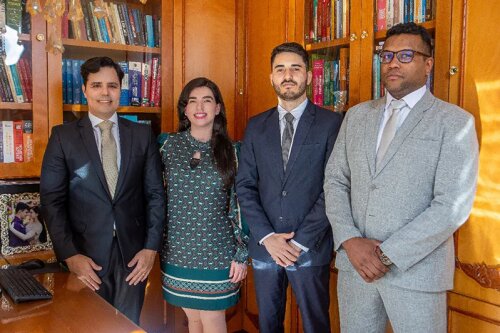Best Biotechnology Lawyers in Goiânia
Share your needs with us, get contacted by law firms.
Free. Takes 2 min.
List of the best lawyers in Goiânia, Brazil
About Biotechnology Law in Goiânia, Brazil
Biotechnology law in Goiânia, Brazil is a specialty that intersects science, law, and industry. Biotechnology involves the use of living organisms or their components to develop products and processes beneficial to society, such as new medicines, agricultural techniques, or genetically modified organisms. In Goiânia, a thriving hub for agribusiness and scientific research, the legal landscape is shaped by federal laws, local regulations, and international treaties concerning innovation, ethics, safety, and environmental protection. Understanding these laws is essential for researchers, startups, farmers, and companies involved in biotechnological advances.
Why You May Need a Lawyer
There are several common situations where seeking legal help is advisable in the field of biotechnology:
- Protecting intellectual property, such as patents for new inventions or processes.
- Complying with local, federal, or international regulations on research, production, and commercialization of biotechnology products.
- Negotiating contracts for research and development, licensing agreements, or technology transfers.
- Handling disputes over ownership of scientific discoveries or genetic resources.
- Responding to regulatory investigations or enforcement actions regarding product safety or environmental impact.
- Ensuring ethical compliance in research that involves human subjects or genetic modification.
- Guidance in participating in public funding programs or incentives for innovation.
Navigating the evolving legal area of biotechnology requires specialized legal guidance to avoid costly errors and maximize opportunities.
Local Laws Overview
Biotechnology in Goiânia is regulated by a combination of federal Brazilian laws and local rules. Key aspects include:
- Biosafety Law (Lei de Biossegurança): Brazilian Federal Law 11.105/2005 establishes rules for genetic engineering and the use of genetically modified organisms, subject to oversight by the National Technical Commission on Biosafety (CTNBio).
- Intellectual Property Law: Law 9.279/1996 and related regulations protect inventions, industrial designs, and trademarks, including biotechnology patents.
- Ethical oversight: Research involving humans or animals requires approval from local ethics committees and must comply with Brazilian ethical standards.
- Environmental licensing: Activities impacting the environment must comply with state and municipal environmental regulations and may require permits from the Goiânia city government or Goiás state agencies.
- Access to Genetic Heritage: Federal regulations control research relating to Brazilian biodiversity and genetic resources, safeguarding indigenous rights and benefit sharing.
Local rules in Goiânia may include additional requirements for research facilities, laboratory safety, waste disposal, and cooperation with municipal departments overseeing science and technology initiatives.
Frequently Asked Questions
What types of biotechnology activities require government approval in Goiânia?
Any activity involving genetically modified organisms, research with human subjects, animal experimentation, or significant environmental impact generally requires government approval at the federal, state, or local level.
How do I protect my invention or research in biotechnology?
You can apply for patents, industrial design registration, or copyright protection with Brazil’s National Institute of Industrial Property (INPI). Consult a lawyer to ensure proper documentation and legal compliance during the application process.
Are there special rules for research involving human genetic material?
Yes, research involving human genetic material requires approval from an ethics committee and strict adherence to privacy, consent, and health regulations as outlined by federal law and the National Health Council (CNS).
Can foreign companies participate in biotechnology activities in Goiânia?
Foreign companies may operate in Brazil, subject to local incorporation requirements and restrictions on accessing certain genetic resources or strategic sectors. Legal assistance is strongly advised.
Are there incentives or grants for biotechnology startups in Goiânia?
Yes, both the federal government and Goiás state offer funding programs, tax incentives, and incubators to support innovation and entrepreneurship in biotechnology.
What environmental regulations must biotechnology companies follow?
Companies must comply with waste management rules, environmental licensing, and federal biosafety regulations, and may need to conduct impact assessments for certain activities in Goiânia.
How is liability determined for biotechnology-related injuries or environmental harm?
Brazilian law holds companies strictly liable for damage caused by genetically modified organisms or hazardous activities. Insurance and compliance are important risk management strategies.
Can I use foreign biotechnological patents in Brazil?
You must register foreign patents locally with INPI. Some international agreements make this process simpler, but a Brazilian legal representative is required.
Who regulates biotechnology research in Goiânia?
The main regulators are CTNBio, the National Health Surveillance Agency (ANVISA), and local ethical or scientific committees, as well as state and municipal authorities for certain activities.
What should I do if I receive a notice of non-compliance?
Contact a biotechnology lawyer immediately. Do not respond before understanding the allegations and potential consequences. Legal guidance can help you correct issues and respond appropriately to authorities.
Additional Resources
If you need more information or assistance, the following resources and organizations are helpful:
- National Technical Commission on Biosafety (CTNBio): Responsible for biosafety and GMO regulation in Brazil.
- National Institute of Industrial Property (INPI): Handles patents, trademarks, and intellectual property registration.
- Goiás State Secretariat of Environment and Sustainable Development (SEMAD): Regulates environmental licensing in Goiás.
- Federal University of Goiás (UFG): Offers biotechnology research, legal expertise, and ethical committee resources.
- Sebrae Goiás: Supports startups and entrepreneurs, including those in biotechnology.
- Brazilian Association of Biotechnology (ABBI): Industry network and advocacy group.
Next Steps
If you need legal assistance in the field of biotechnology in Goiânia:
- Gather all relevant documents, including research proposals, contracts, correspondence, and any government notices.
- Define your goals and challenges, such as protecting an invention, securing licenses, or responding to a regulatory inquiry.
- Contact a lawyer or law firm specializing in biotechnology, intellectual property, or regulatory law in Goiânia. Look for professionals with experience in science and technology matters and knowledge of local regulations.
- Schedule a consultation to discuss your specific situation. During the meeting, ask about the legal strategies, timelines, costs, and steps you should follow.
- Stay informed about regulatory developments and maintain open communication with your legal adviser for ongoing compliance.
Taking these steps will help ensure your activities in the dynamic area of biotechnology are legally secure and successful in Goiânia, Brazil.
Lawzana helps you find the best lawyers and law firms in Goiânia through a curated and pre-screened list of qualified legal professionals. Our platform offers rankings and detailed profiles of attorneys and law firms, allowing you to compare based on practice areas, including Biotechnology, experience, and client feedback.
Each profile includes a description of the firm's areas of practice, client reviews, team members and partners, year of establishment, spoken languages, office locations, contact information, social media presence, and any published articles or resources. Most firms on our platform speak English and are experienced in both local and international legal matters.
Get a quote from top-rated law firms in Goiânia, Brazil — quickly, securely, and without unnecessary hassle.
Disclaimer:
The information provided on this page is for general informational purposes only and does not constitute legal advice. While we strive to ensure the accuracy and relevance of the content, legal information may change over time, and interpretations of the law can vary. You should always consult with a qualified legal professional for advice specific to your situation.
We disclaim all liability for actions taken or not taken based on the content of this page. If you believe any information is incorrect or outdated, please contact us, and we will review and update it where appropriate.









